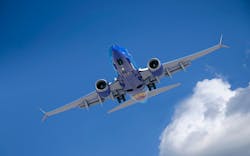Boeing Says Bombardier Dumping Puts New 737 Planes in Jeopardy
Boeing Co. warned that its 737 Max 7 passenger jet may not survive if Bombardier Inc. continues to sell planes in the U.S. below fair-market value.
“Our Max 7 is at extreme risk,” Kevin McAllister, CEOof Boeing Commercial Airplanes, told a panel at the U.S. International Trade Commission on Dec. 18. “If you don’t level the playing field now, it will be too late.”
The Max 7 is the smallest of Boeing’s upgraded 737 airplanes. The company has accused Bombardier of dumping its narrow-body C Series jet, which in some configurations can carry a similar passenger load, on the U.S. market at below-market prices and taking unfair subsidies from the Canadian and Quebec governments. The ITC, a quasi-judicial body, is hearing arguments in the case and is expected to give its final ruling next month.
Canada’s ambassador to the U.S. said a ruling in favor of Boeing would disrupt supply chains in the aerospace industry and cost American jobs, as portions of the C Series are made in the U.S.
But McAllister said Bombardier is offering its C Series at “used-airplane prices,” putting pressure on competitors to slash prices. “Customer demand for reduced prices is greater than ever,” he said. “The harm is real right now.”
First Round
Boeing won the first round in its fight with Bombardier over the C Series jets. The U.S. Commerce Department sided with the Chicago-based company in a preliminary ruling in October and ordered tariffs of about 300 percent. The ITC process runs parallel to one run by Commerce and will decide if the tariffs become permanent.
While President Donald Trump is unlikely to intervene in the case, the dispute is a test of his pledge to enforce U.S. trade laws more strictly while encouraging foreign investment. The case has bruised U.S. relations with Canada and the U.K., which also builds part of the plane. Canadian Prime Minister Justin Trudeau this month canceled an order of Boeing fighter jets in retaliation.
The British government has warned Boeing it could lose U.K. defense contracts as well. Prime Minister Theresa May has said she was “bitterly disappointed” by the tariffs.
‘Jobs in Jeopardy’
A decision in Boeing’s favor “would put U.S. jobs in jeopardy,” Canadian Ambassador David MacNaughton said Monday. “There is no reason to believe that an affirmative determination would lead Boeing to create any more jobs to compensate for this loss to the U.S. workforce.”
The ITC ruling is critical to Bombardier’s medium-term profitability as it prepares to deliver the planes to Delta Air Lines Inc., which has vowed not to pay the 300 percent tariff. In April 2016, the No. 2 U.S. airline ordered 75 of Bombardier’s CS100 jets. The order has a list value of $5.6 billion before customary discounts.
Bombardier hasn’t disclosed Delta’s price, nor has it revealed its unit costs in building the aircraft. Losing the case would make other U.S. carriers hesitant about buying the C Series and could potentially prompt Delta to drop the order, analysts have said.
Bombardier, a crown jewel of Canadian manufacturing, has billed itself as a major U.S. employer in the run-up to the ITC hearing. It employs about 7,000 in 17 American states.
By Andrew Mayeda and John McCormick
About the Author
Bloomberg
Licensed content from Bloomberg, copyright 2016.
